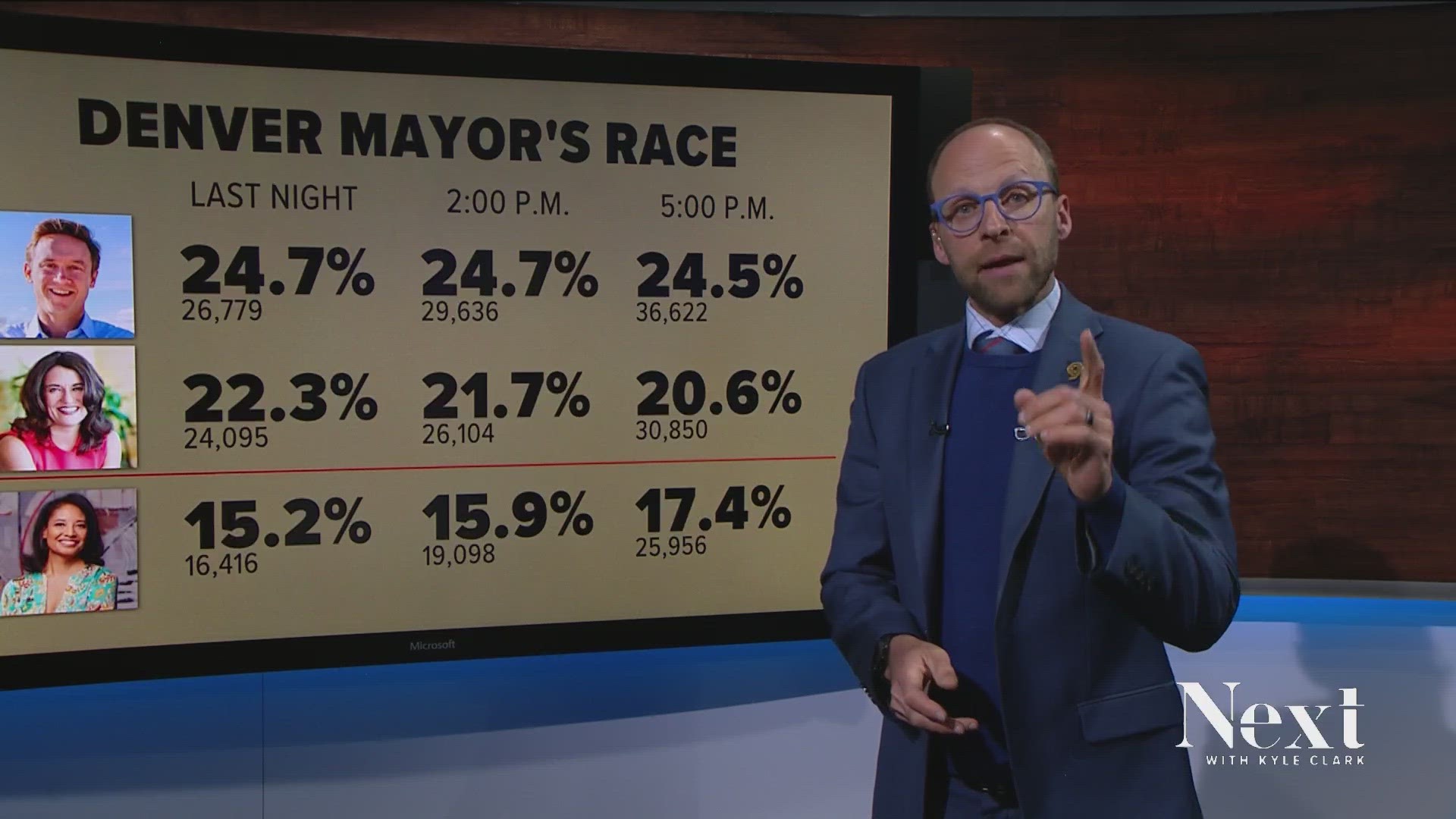DENVER — More than 23,000 votes remain to be counted, but Denver is closer to knowing who will be headed to a runoff from the enormous pool of candidates for mayor.
As of 5 p.m. Wednesday, Mike Johnston continues to lead the race with 24.5% of the vote, followed by Kelly Brough with 20.6%.
A winner must secure 50% of the vote, and with 16 candidates, that was nearly impossible to achieve in the initial election. The runoff will happen June 6. The top two candidates will compete.
>See all Denver election results here
Johnston and Brough have held the top two spots since polls closed on Tuesday night.
"Denver chose optimism, hope and change tonight," Johnston said at his watch party Tuesday.
And in a press release, Brough said her campaign is "cautiously optimistic" she'll make it to the next round.
If their leads hold, voters would find similar ideologies in Johnston and Brough. Both want to hire more police officers. Both oppose the idea of rent control. Both say Denver should not have a supervised injection site.
Both also supported the development of the Park Hill Golf Course, as proposed to voters in this same election.
While each candidate wants to enforce the city’s camping ban, Brough, however, said she would forcibly arrest people in violation of the camping ban as a “last resort” if they do not accept the help being provided.
Both are also political insiders -- Johnston, a former school principal and former state senator, and Brough, the chief of staff to Denver Mayor John Hickenlooper and later president and CEO of the Denver-Metro Chamber of Commerce.
Maintaining her position in third place has been Lisa Calderón, a progressive candidate with distinctly different positions compared to the other two.
Calderón, currently with 17.3% support, continued to shrink the gap between her and Brough since polls closed. Wednesday afternoon, the space between Brough and Calderón shrunk to just less than 6 percentage points. By the evening, the difference was three points -- a difference of 4,800 votes.
Calderón got 23% of the 30,000 votes in Denver Elections' last update of Wednesday. Brough got 16%. With about 23,000 more ballots to count, the math is still in Brough's favor.
More results will be released Thursday.
These leading candidates were three of 17 -- Calderón, Trinidad Rodriguez, Aurelio Martinez, Thomas Wolf, Al Gardner, Terrance Roberts, Kwame Spearman, Renate Behrens, Chris Hansen, Johnston, James Walsh, Ean Thomas Tafoya, Andy Rougeout, Leslie Herod, Robert Treta, Debbie Ortega and Brough -- who appeared on the 2023 ballot, though Spearman dropped out weeks before Election Day.
Two others have acknowledged that election night was the end of the road for their campaigns. Hansen, in sixth place, told supporters on Tuesday night it was clear he wouldn't make the runoff. Rougeot, the sole Republican in the race who is in fourth place with 12% of the vote, conceded the race Wednesday afternoon.
In terms of candidate financials, Johnston and Brough were the top fundraisers in the 2023 mayoral race, and together they received 39% of the Fair Elections Fund money distributed to the 13 candidates who opted to participate.
Voters approved the Fair Elections Fund in 2018 to essentially allow lesser-known individuals to jump in the race and get public money (a nine-to-one match for donations $50 and less) for their campaigns. But out of the $3.5 million in Fair Elections Fund money, $1.36 million went to Johnston and Brough because of their large number of small-money, Denver-based donors. Not every candidate opted in, but the other 11 participants shared the rest.
Calderón ranked seventh in funds raised, while Herod ranked third.
As Mayor Michael Hancock is now finishing his third term, this was Denver’s first mayoral election without an incumbent in 12 years.
There were eight candidates in 2011. Chris Romer, the son of former Gov. Roy Romer, finished first, Hancock finished second and 44% of the people who voted did not select either of them.
When people voted a second time in the runoff, Hancock won easily.
The next mayor, whoever that may be, will have what is perhaps the most powerful job in Colorado -- arguably more so than the governor because Denver’s mayor controls the city budget while the state legislature, not the governor, controls the state budget. The mayor also has enormous control over signature projects for Colorado, from the airport to development.
SUGGESTED VIDEOS: Full Episodes of Next with Kyle Clark

